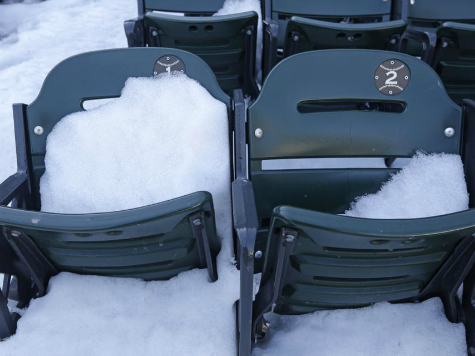
It’s spring. But Mother Nature forgot to give the message to Minneapolis, Milwaukee, and Boston.
Grounds crews at multiple Major League Baseball parks work feverishly to prepare fields for opening day. But when the Detroit area has endured 91 inches of snow this winter–three inches away from breaking a 133-year-old record–the job of transforming white wastelands into green fields becomes more difficult. March in Detroit is no climate fit for a Tiger.
Roger Boussard, groundskeeper of the Chicago White Sox, has never experienced anything quite like the winter of 2013-2014. “This has actually been the perfect storm for me,” he tells the Associated Press. “I’ve been in this for 45 years and I’ve seen a lot of snow. Certainly, that’s not hard to handle…. My problem actually is the permafrost. I’ve actually never run into where I’ve got 30 inches of permafrost.” Broussard estimates his workers removed 400 tons of snow last week.
It wasn’t Broussard’s imagination playing tricks on him. According to the National Oceanic and Atmospheric Administration (NOAA), 2013-2014 played out a degree below normal on average. That’s good for the 34th coldest winter on record in the United States. The West Coast experienced a warm winter. But Midwesterners more than made up for their unseasonable experience by enduring one the most frigid winters on record.
And, despite what the calendar says, it’s not quite over yet. In Minneapolis, where the Twins opened up their new outdoor ballpark four years ago, meteorologists forecast the mercury to dip into the single digits over the weekend. The forecast calls for some snow this weekend for Milwaukee. Detroit faces 14 degrees over the weekend and another possible snowfall next week.
The Tigers and Brewers open their seasons at home on March 31. The Twins enjoy another week of preparation for the home opener as a gift from the scheduling gods. Shoveling out seats, heating up fields, and transforming iced-over grass into the genuine–or not so genuine–green article remain challenges for many groundskeepers. The delightful sound of hard wood smacking a leather ball, or the signature smells of popcorn and hot dogs, don’t have quite the same effect on the senses when the eyes see snow and the body feels chills.
At Fenway Park, where I sold various edibles and refreshments for seven seasons, night games in April occasionally meant trading in a tray of Cokes for hot chocolates. The red uniforms given to us by the since-absorbed Harry M. Stevens company yielded to gray sweatshirts. Even miles of walking up stairs with hot trays doesn’t do enough to warm up the body in early-spring nights in the northeast. The first pitch of weekday games, normally after 7 p.m., comes during the afternoon during those early days of April when the weather suffers from a winter-spring personality disorder.
But if the NHL can skate in Dodger Stadium in January, Major League Baseball can surely play a nine-inning game at Progressive Field in early April.
Baseball enjoys a time-tested ally in its fight against the frost: global warming. It happens every year around this time. The temperature starts to climb and the snow yields to sunshine. The thermometer, which may flirt with the teens in March, slowly rises into the forties, fifties, sixties, and beyond. By the dog days of August, the Arizona Diamondbacks and Texas Rangers will be wishing it were winter again. At the rate temperatures rise, 140-degree days seem assured. But then, just as gradually as the heat came, it fades again. And then the Earth repeats the process of global cooling to global warming to global cooling. It apparently has something to do with the Sun.
There’s nothing like Opening Day to serve as a seasonal alarm clock announcing that winter’s gone. And the way this winter has gone, fans eagerly await that traditional announcement of the arrival of spring.
“Play ball!”

COMMENTS
Please let us know if you're having issues with commenting.